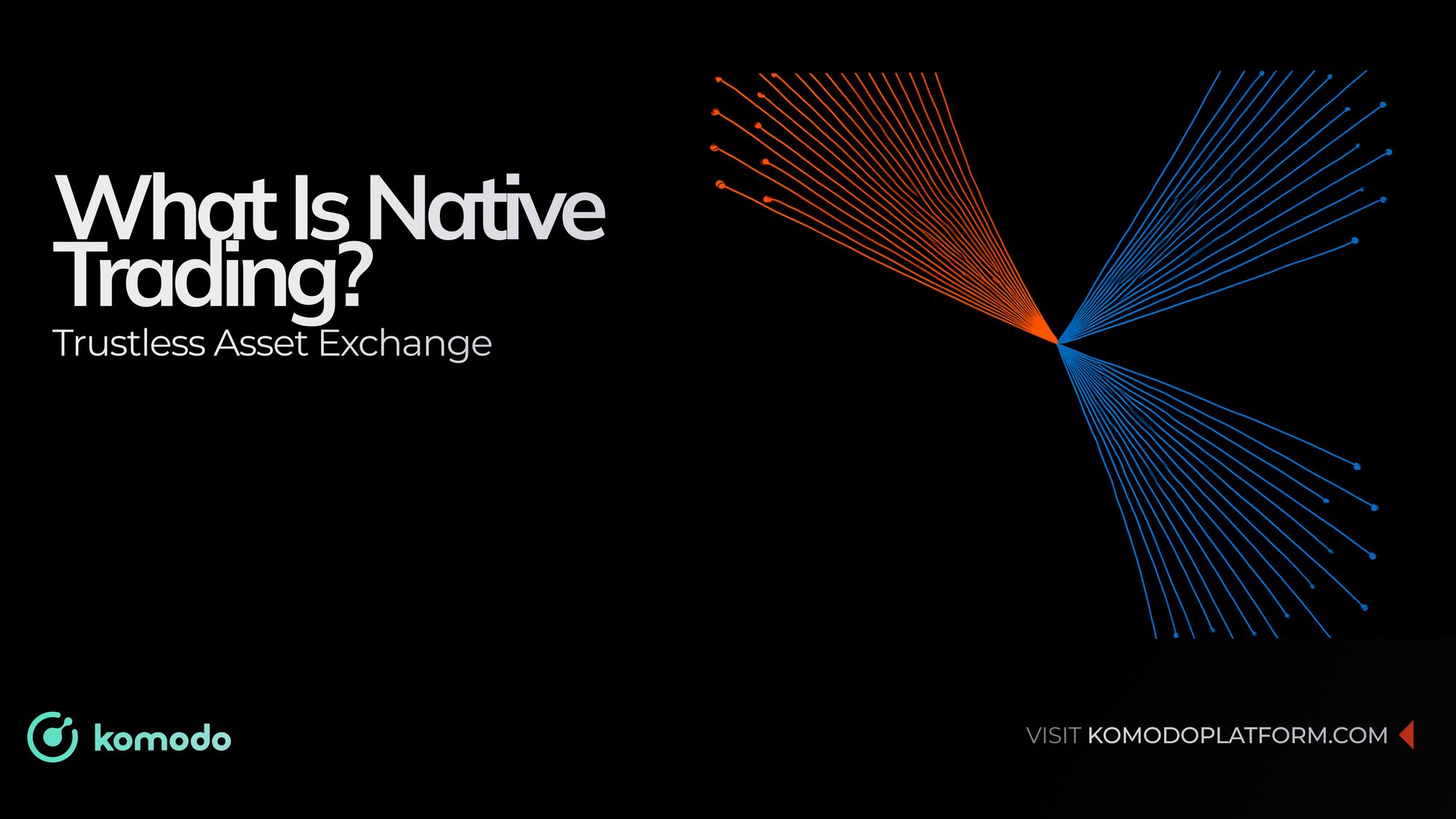Cryptocurrency trading has come a long way. While traditional exchanges require you to trust a third party with your assets, which can be risky, native trading changes that. It gives you complete control over your funds while you trade.
Thanks to blockchain technology, you can trade directly with others without needing an intermediary. Your crypto stays in your wallet until the trade is done, giving you the peace of mind that you're in full control of your assets every step of the way.
What Is Native Trading?
Native trading allows you to trade crypto directly with others on the blockchain, without relying on an exchange to hold your funds. Unlike traditional trading platforms that temporarily store your assets, native trading keeps them in your wallet until the trade is completed.
This is what we call native crypto trading, where your assets stay where they belong - on their native blockchains - and are exchanged safely using atomic swaps or smart contracts. Key characteristics of native trading include:
- You have complete control over your funds, as you retain ownership at all times.
- Transactions are processed directly on the blockchain, ensuring that they are settled on-chain.
- The process is trustless, meaning there's no need to rely on any central authority or intermediary.
How Native Trading Works
Understanding the basics can help you trade with confidence. In native trading, two parties agree to exchange assets directly, such as Ethereum to Bitcoin. Smart contracts or atomic swaps ensure that both parties receive the correct asset, or the trade doesn’t happen at all. There are no custodians involved, as funds are not stored on a third-party platform; instead, the process occurs wallet-to-wallet, using smart contract logic or protocol-specific trustless mechanisms.
Native trading often relies on technologies like atomic swaps, decentralized exchanges (DEXs) with non-custodial order books, and cross-chain bridges to facilitate secure and seamless transactions between different blockchains.
These innovations sidestep the risks found in traditional exchanges, like hacking or company insolvency, and form the foundation of native trading security - a trustless environment where you don’t have to compromise on safety.
Why Choose Native Trading?
Native trading isn't just about cutting out the middleman – it's about putting you in control. Here are some top benefits:
- With native trading, your crypto stays with you until the trade is finalized, which reduces the risks of theft or platform failure.
- Since there’s no centralized exchange involved, there are no KYC checks or invasive data collection, giving you more privacy and autonomy.
- All trades are on-chain, making them visible to everyone and ensuring transparency and auditability.
- Without intermediaries, you’ll experience lower fees and faster execution, improving the overall efficiency of your trades.
Native Crypto Trading vs. Centralized Exchange Trading
Here’s a quick comparison of how native trading stacks up against traditional, centralized exchanges:
| Aspect | Native Trading | Centralized Exchange |
|---|---|---|
| Custody | You hold your assets | Assets held by the exchange |
| Settlement | On-chain, trustless | Off-chain, via third party |
| Security | You control private keys | Platform manages your keys |
| Privacy | No KYC needed | KYC usually required |
| Counterparty Risk | Minimal (automated process) | Exists (default, hacks possible) |
| Flexibility | Broad asset/trading pairs | Only listed asset pairs |
The Role of Trustless Asset Exchange
Trustless asset exchange is the engine behind native trading. Here’s how native trading works in a trustless context:
- Automate trade settlement, ensuring parties cannot cheat or default.
- Removing the need for a central authority minimizes systemic risks.
- Every transaction is publicly verifiable on-chain, providing full auditability.
This approach is especially important for assets like native bitcoin, where decentralization and control over private keys are essential for secure, censorship-resistant trading.
The Future of Secure, Trustless Exchange Starts with Komodo Wallet
With features like atomic swap technology, Komodo Wallet lets you swap assets between different blockchains without ever giving up custody of your coins. You stay in control, enjoy more privacy, and experience true decentralization - no middlemen required.
FAQs
Can I trade Bitcoin for Ethereum using native trading?
Yes, with atomic swaps, you can trade BTC and ETH directly and securely, without wrapped tokens.
Is native trading available on all cryptocurrencies?
Not all coins support native trading yet, but most major ones - like Bitcoin, Ethereum, and Litecoin - do.
How is native trading different from using a centralized exchange?
Centralized exchanges hold your funds and act as a go-between, which adds risk and usually requires personal information. Native trading happens wallet-to-wallet, putting you in full control with no middleman required.
